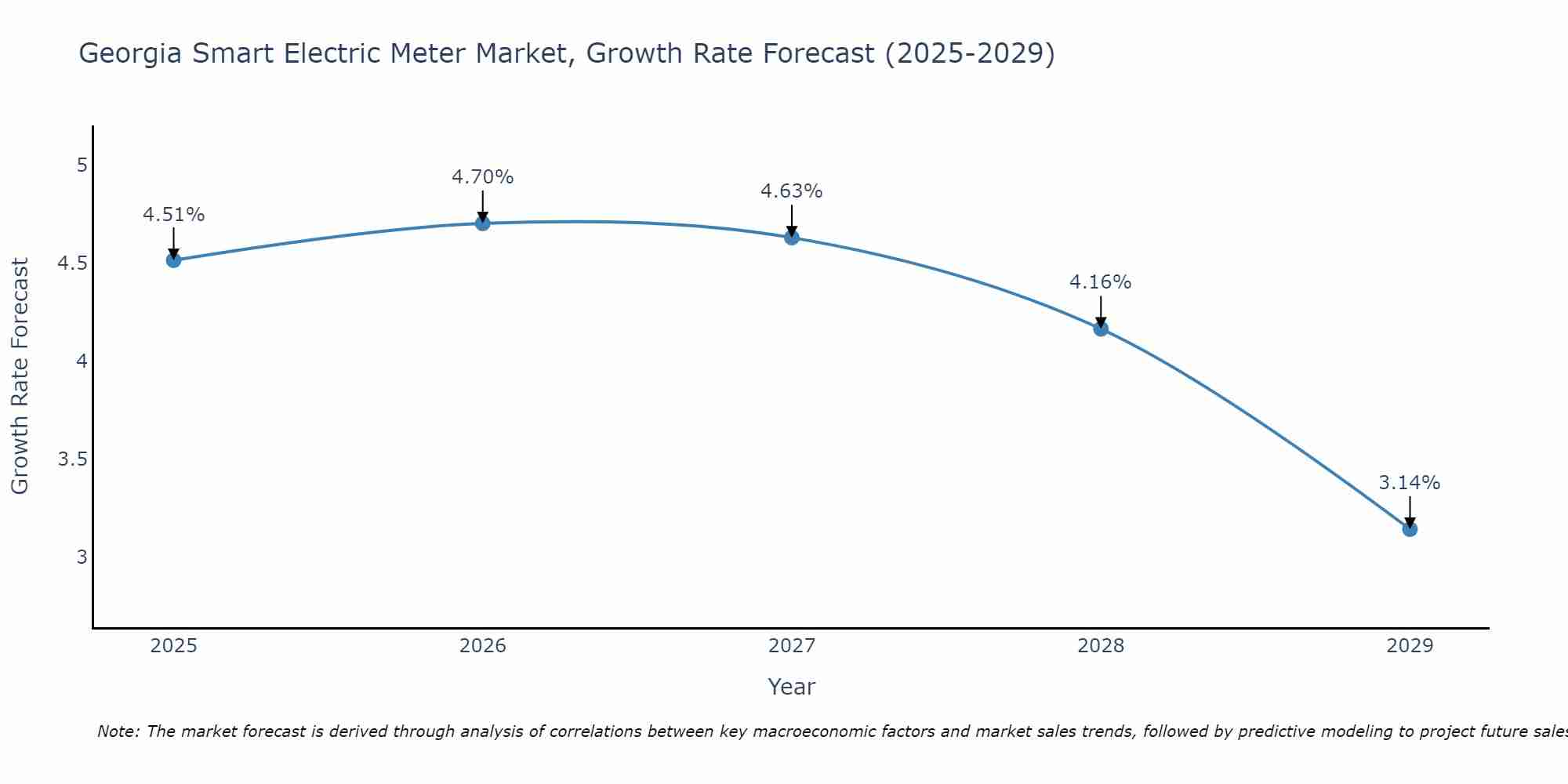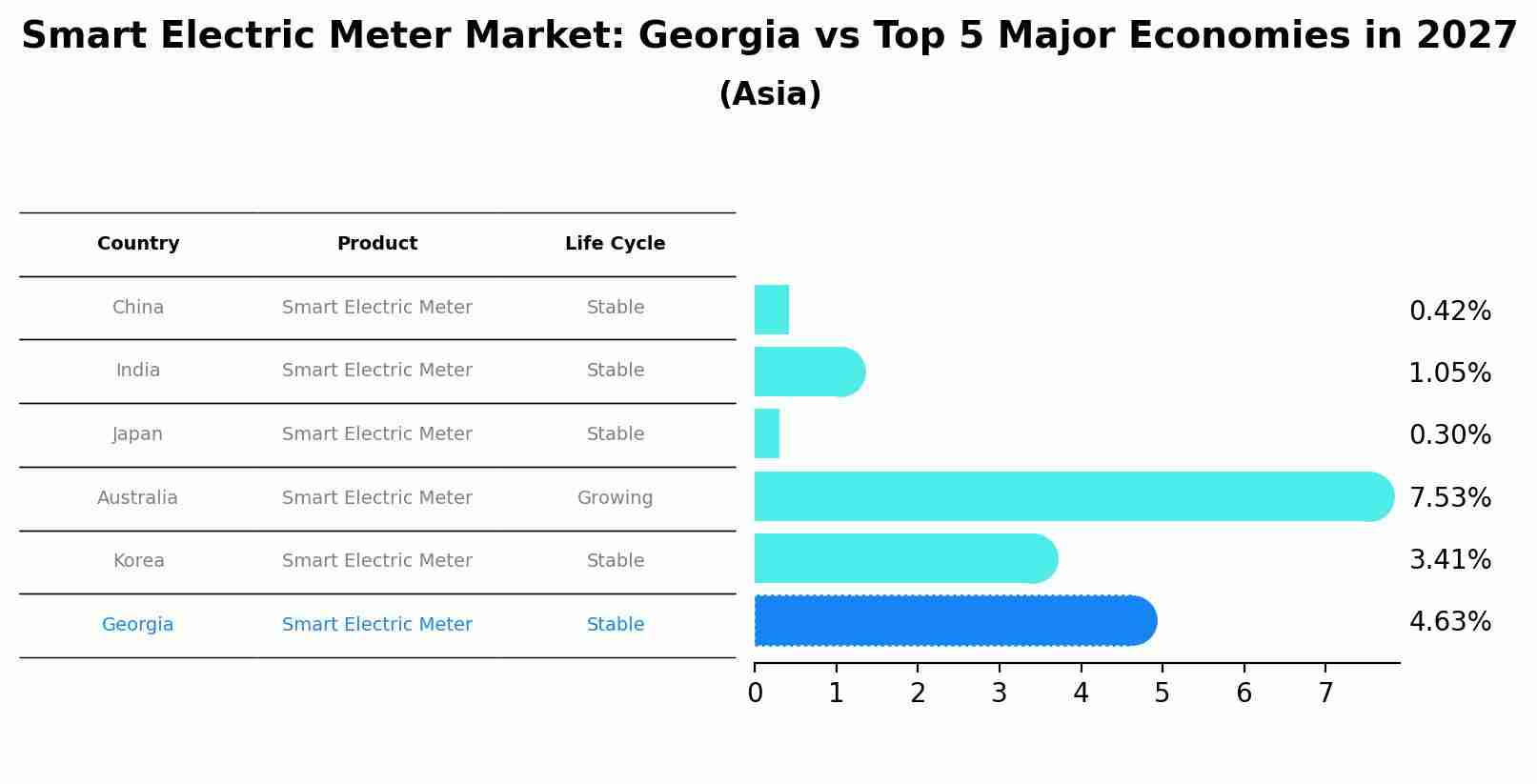Georgia Smart Electric Meter Market Outlook | Size, Growth, COVID-19 IMPACT, Share, Revenue, Trends, Forecast, Analysis, Companies, Value & Industry
| Product Code: ETC369360 | Publication Date: Aug 2022 | Updated Date: Jul 2025 | Product Type: Market Research Report | |
| Publisher: 6Wresearch | Author: Summon Dutta | No. of Pages: 75 | No. of Figures: 35 | No. of Tables: 20 |
Georgia Smart Electric Meter Market Size Growth Rate
The Georgia Smart Electric Meter Market is projected to witness mixed growth rate patterns during 2025 to 2029. Starting at 4.51% in 2025, the market peaks at 4.70% in 2026, and settles at 3.14% by 2029.

Smart Electric Meter Market: Georgia vs Top 5 Major Economies in 2027 (Asia)
By 2027, Georgia's Smart Electric Meter market is forecasted to achieve a stable growth rate of 4.63%, with China leading the Asia region, followed by India, Japan, Australia and South Korea.

Georgia Smart Electric Meter Market Synopsis
The Georgia Smart Electric Meter Market is witnessing significant growth driven by the increasing adoption of smart grid technologies and the need for more efficient energy management systems. Smart meters are being deployed across the state to enable two-way communication between utilities and consumers, allowing for real-time monitoring of energy consumption and better demand response capabilities. Key players in the market include Georgia Power, Southern Company, and other utility providers who are investing in modernizing the state`s electrical infrastructure. Regulatory support and incentives for smart meter installations further propel market growth as consumers and businesses alike seek to optimize their energy usage and reduce costs. Overall, the Georgia Smart Electric Meter Market is poised for continued expansion as the state moves towards a more sustainable and technologically advanced energy landscape.
Georgia Smart Electric Meter Market Trends
The Georgia Smart Electric Meter Market is currently experiencing a shift towards advanced metering infrastructure (AMI) systems, driven by the increasing focus on energy efficiency, grid modernization, and demand-side management. Utilities in Georgia are transitioning from traditional analog meters to smart electric meters that provide real-time data on energy consumption, enable remote monitoring and control, and support two-way communication between utilities and consumers. This shift towards smart meters is aimed at improving operational efficiency, reducing electricity theft, enhancing customer engagement through energy usage insights, and facilitating the integration of renewable energy sources. Furthermore, the deployment of smart meters in Georgia is expected to support the state`s sustainability goals and contribute to a more resilient and reliable electricity grid.
Georgia Smart Electric Meter Market Challenges
The Georgia Smart Electric Meter Market faces challenges such as high initial installation costs, resistance from consumers due to privacy concerns, and regulatory hurdles. The cost of deploying smart meters across the state can be significant, leading to financial strain for utility companies and potentially higher electricity rates for customers. Additionally, some consumers may be hesitant to adopt smart meters due to worries about data privacy and security issues. Regulatory challenges, including navigating complex approval processes and ensuring compliance with state regulations, also pose obstacles to the widespread implementation of smart meters in Georgia. Overcoming these challenges will require collaboration among stakeholders to address cost concerns, educate consumers about the benefits of smart meters, and work towards establishing clear regulatory frameworks to support their adoption.
Georgia Smart Electric Meter Market Investment Opportunities
The Georgia Smart Electric Meter Market presents several investment opportunities for companies involved in smart grid technology, energy management systems, and data analytics. With the increasing focus on energy efficiency and sustainability, there is a growing demand for smart electric meters that can provide real-time data on energy consumption and enable better monitoring and control of electricity usage. Investors can consider opportunities in smart meter manufacturing, installation services, software development for data analysis, and partnerships with utility companies looking to upgrade their infrastructure. Additionally, there is potential for growth in demand response programs and integration of renewable energy sources, creating a fertile ground for innovation and investment in the Georgia Smart Electric Meter Market.
Jordan Agar Market Government Policies
In Georgia, the smart electric meter market is regulated by the Georgia Public Service Commission (PSC), which oversees utility rates and services in the state. The PSC has approved various policies to promote the deployment of smart meters, such as the Advanced Metering Infrastructure (AMI) deployment plans submitted by electric utilities. These plans outline the timeline and investment required for transitioning to smart meters, which offer benefits like improved grid management, energy efficiency, and customer engagement. The PSC also ensures that smart meter deployment meets regulatory requirements for data privacy and security to protect consumer information. Overall, the government policies in Georgia aim to facilitate the adoption of smart meters to modernize the electric grid and enhance the efficiency and reliability of electricity services in the state.
Georgia Smart Electric Meter Market Future Outlook
The Georgia Smart Electric Meter Market is expected to witness steady growth in the upcoming years due to increasing emphasis on energy efficiency and sustainability. The state`s initiatives aimed at modernizing the electric grid and promoting smart technologies will drive the adoption of smart electric meters among residential, commercial, and industrial consumers. Advancements in smart meter technology, such as real-time data monitoring and remote access capabilities, will further boost market growth by enabling better energy management and cost savings. Additionally, government regulations promoting the deployment of smart grids and meters are likely to create a conducive environment for market expansion. Overall, the Georgia Smart Electric Meter Market is poised for growth as utilities and consumers increasingly recognize the benefits of smart metering solutions.
Key Highlights of the Report:
- Georgia Smart Electric Meter Market Outlook
- Market Size of Georgia Smart Electric Meter Market, 2021
- Forecast of Georgia Smart Electric Meter Market, 2031
- Historical Data and Forecast of Georgia Smart Electric Meter Revenues & Volume for the Period 2018 - 2031
- Georgia Smart Electric Meter Market Trend Evolution
- Georgia Smart Electric Meter Market Drivers and Challenges
- Georgia Smart Electric Meter Price Trends
- Georgia Smart Electric Meter Porter's Five Forces
- Georgia Smart Electric Meter Industry Life Cycle
- Historical Data and Forecast of Georgia Smart Electric Meter Market Revenues & Volume By Phase for the Period 2018 - 2031
- Historical Data and Forecast of Georgia Smart Electric Meter Market Revenues & Volume By Single for the Period 2018 - 2031
- Historical Data and Forecast of Georgia Smart Electric Meter Market Revenues & Volume By Three for the Period 2018 - 2031
- Historical Data and Forecast of Georgia Smart Electric Meter Market Revenues & Volume By Communication Technology Type for the Period 2018 - 2031
- Historical Data and Forecast of Georgia Smart Electric Meter Market Revenues & Volume By Power Line Communication (PLC) for the Period 2018 - 2031
- Historical Data and Forecast of Georgia Smart Electric Meter Market Revenues & Volume By Radio Frequency (RF) for the Period 2018 - 2031
- Historical Data and Forecast of Georgia Smart Electric Meter Market Revenues & Volume By Cellular for the Period 2018 - 2031
- Historical Data and Forecast of Georgia Smart Electric Meter Market Revenues & Volume By End-Users for the Period 2018 - 2031
- Historical Data and Forecast of Georgia Smart Electric Meter Market Revenues & Volume By Industrial for the Period 2018 - 2031
- Historical Data and Forecast of Georgia Smart Electric Meter Market Revenues & Volume By Commercial for the Period 2018 - 2031
- Historical Data and Forecast of Georgia Smart Electric Meter Market Revenues & Volume By Residential for the Period 2018 - 2031
- Georgia Smart Electric Meter Import Export Trade Statistics
- Market Opportunity Assessment By Phase
- Market Opportunity Assessment By Communication Technology Type
- Market Opportunity Assessment By End-Users
- Georgia Smart Electric Meter Top Companies Market Share
- Georgia Smart Electric Meter Competitive Benchmarking By Technical and Operational Parameters
- Georgia Smart Electric Meter Company Profiles
- Georgia Smart Electric Meter Key Strategic Recommendations
Frequently Asked Questions About the Market Study (FAQs):
- Single User License$ 1,995
- Department License$ 2,400
- Site License$ 3,120
- Global License$ 3,795
Search
Related Reports
- ASEAN Bearings Market (2025-2031) | Strategy, Consumer Insights, Analysis, Investment Trends, Opportunities, Growth, Size, Share, Industry, Revenue, Segments, Value, Segmentation, Supply, Forecast, Restraints, Outlook, Competition, Drivers, Trends, Demand, Pricing Analysis, Competitive, Strategic Insights, Companies, Challenges
- Europe Flooring Market (2025-2031) | Outlook, Share, Industry, Trends, Forecast, Companies, Revenue, Size, Analysis, Growth & Value
- Saudi Arabia Manlift Market (2025-2031) | Outlook, Size, Growth, Trends, Companies, Industry, Revenue, Value, Share, Forecast & Analysis
- Uganda Excavator, Crane, and Wheel Loaders Market (2025-2031) | Strategy, Consumer Insights, Analysis, Investment Trends, Opportunities, Growth, Size, Share, Industry, Revenue, Segments, Value, Segmentation, Supply, Forecast, Restraints, Outlook, Competition, Drivers, Trends, Demand, Pricing Analysis, Competitive, Strategic Insights, Companies, Challenges
- Rwanda Excavator, Crane, and Wheel Loaders Market (2025-2031) | Strategy, Consumer Insights, Analysis, Investment Trends, Opportunities, Growth, Size, Share, Industry, Revenue, Segments, Value, Segmentation, Supply, Forecast, Restraints, Outlook, Competition, Drivers, Trends, Demand, Pricing Analysis, Competitive, Strategic Insights, Companies, Challenges
- Kenya Excavator, Crane, and Wheel Loaders Market (2025-2031) | Strategy, Consumer Insights, Analysis, Investment Trends, Opportunities, Growth, Size, Share, Industry, Revenue, Segments, Value, Segmentation, Supply, Forecast, Restraints, Outlook, Competition, Drivers, Trends, Demand, Pricing Analysis, Competitive, Strategic Insights, Companies, Challenges
- Angola Excavator, Crane, and Wheel Loaders Market (2025-2031) | Strategy, Consumer Insights, Analysis, Investment Trends, Opportunities, Growth, Size, Share, Industry, Revenue, Segments, Value, Segmentation, Supply, Forecast, Restraints, Outlook, Competition, Drivers, Trends, Demand, Pricing Analysis, Competitive, Strategic Insights, Companies, Challenges
- Israel Intelligent Transport System Market (2025-2031) | Strategy, Consumer Insights, Analysis, Investment Trends, Opportunities, Growth, Size, Share, Industry, Revenue, Segments, Value, Segmentation, Supply, Forecast, Restraints, Outlook, Competition, Drivers, Trends, Demand, Pricing Analysis, Competitive, Strategic Insights, Companies, Challenges
- Uganda Precast and Aggregate Market (2025-2031) | Strategy, Consumer Insights, Analysis, Investment Trends, Opportunities, Growth, Size, Share, Industry, Revenue, Segments, Value, Segmentation, Supply, Forecast, Restraints, Outlook, Competition, Drivers, Trends, Demand, Pricing Analysis, Competitive, Strategic Insights, Companies, Challenges
- Australia IT Asset Disposal Market (2025-2031) | Strategy, Consumer Insights, Analysis, Investment Trends, Opportunities, Growth, Size, Share, Industry, Revenue, Segments, Value, Segmentation, Supply, Forecast, Restraints, Outlook, Competition, Drivers, Trends, Demand, Pricing Analysis, Competitive, Strategic Insights, Companies, Challenges
Industry Events and Analyst Meet
Our Clients
Whitepaper
- Middle East & Africa Commercial Security Market Click here to view more.
- Middle East & Africa Fire Safety Systems & Equipment Market Click here to view more.
- GCC Drone Market Click here to view more.
- Middle East Lighting Fixture Market Click here to view more.
- GCC Physical & Perimeter Security Market Click here to view more.
6WResearch In News
- Doha a strategic location for EV manufacturing hub: IPA Qatar
- Demand for luxury TVs surging in the GCC, says Samsung
- Empowering Growth: The Thriving Journey of Bangladesh’s Cable Industry
- Demand for luxury TVs surging in the GCC, says Samsung
- Video call with a traditional healer? Once unthinkable, it’s now common in South Africa
- Intelligent Buildings To Smooth GCC’s Path To Net Zero













